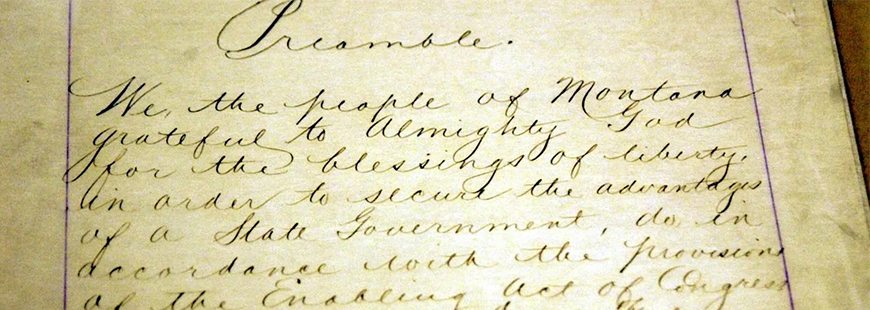II.11. Searches and Seizures
History
Sources
1884 Montana Constitution (proposed)
That the people shall be secure in their persons, papers, homes, and effects, from unreasonable searches and seizures; and no warrant to search any place or seize any person or thing, shall issue, without describing the place to be searched or the person or thing to be seized, as near as may be, nor without probable cause, supported by oath or affirmation, reduced to writing.
1889 Montana Constitution
The people shall be secure in their persons, papers, homes and effects, from unreasonable searches and seizures, and no warrant to search any place or seize any person or thing, shall issue without describing the place to be searched, or the person or thing to be seized, nor without probable cause, supported by oath or affirmation, reduced to writing.
Other Sources
1876 Colorado Constitution. The people shall be secure in their persons, papers, homes and effects, from unreasonable searches and seizures; and no warrant to search any place or seize any person or things shall issue without describing the place to be searched, or the person or thing to be seized, as near as may be, nor without probable cause, supported by oath or affirmation reduced to writing.
Drafting
Delegate Proposal No. 14 (Campbell, Eck, Scanlin, Murray, Cate, Aronow, Vermillion, McKeon, Monroe): The people shall be secure in their persons, papers, homes, and effects, from unreasonable searches and seizures, invasions of privacy, and a warrant to search any place, utilize electronic or other means to intercept oral or other communications, or seize any person or thing shall issue without describing the place to be searched, or the person or thing to be seized, nor without probable cause, supported by oath or affirmation, reduced to writing.
Bill of Rights Committee Proposal No. 8 The people shall be secure in their persons, papers, homes, and effects, from unreasonable searches and seizures and invasions of privacy, and a warrant to search any place, or seize any person or thing shall issue without describing the place to be searched, or the person or thing to be seized, nor without probable cause, supported by oath or affirmation, reduced to writing.
Proposal No. 14 was rejected in part due to the incorporation of the electronic surveillance and communications interception language. The committee deleted the reference to interception of communications, because the committee did not wish to authorize, implicitly or explicitly, the interception of communications by state officials. Further, the committee noted that no testimony was given that alleged the need for wiretapping authority at the state level. The committee believed that the privacy of communications should be inviolate from state level interceptions.Montana Constitutional Convention, Vol. II at 633
Committee Proposal No. 8 was introduced to the Delegates on March 7, 1972 for amendments and adoption. (Verbatim Transcript 1682). Delegate Campbell noted to the Delegates that the committee "felt very strongly that the people of Montana should be protected as much as possible against eavesdropping, electronic surveillance, and such type of activities."Verbatim Transcript 1682 (Mar. 7, 1972). However, after consideration, it was the committee's feelings that this should not be "solidified and cemented into the Constitution; it should be made a legislative matter."Verbatim Transcript 1683 (Mar. 7, 1972).
Delegate Campbell then spoke to the committee about the addition of the language "invasions of privacy." Delegate Campbell stated, "We have added, in addition, that a person's papers, homes, effects should be protected as well as invasions of privacy. This is a two-pronged approach with the other right of privacy in Section 10. this is one that would affect the officer and the local person enforcing the law. It would not make any more difficult his right to receive a search warrant."Verbatim Transcript 1683 (Mar. 7, 1972).
Delegate Robinson moved to amend Section 11 by adding the following sentence: "Privacy of communications shall be inviolate."Verbatim Transcript 1683 (Mar. 7, 1972). Delegate Robinson felt very strongly about the state not ever engaging in wiretapping practices. Delegate Holland resisted this amendment on the grounds that the term "communications" is too broad.Verbatim Transcript 1684 (Mar. 7, 1972). To remedy Delegate Holland's concern, Delegate Campbell moved to add the word "oral" to Delegate Robinson's amendment.Verbatim Transcript 1685 (Mar. 7, 1972). The amendment would now read that "privacy or oral communications shall be inviolate." The Delegates continued to raise concerns regarding the new proposed language. Delegate Dahood was not satisfied that the language would reach the kind of electronic surveillance that the committee sought to proscribe.Verbatim Transcript 1687 (Mar. 7, 1972). Delegate Dahood suggested withdrawing the amendment and using the term "electronic surveillance" in a phrase. Both Delegate Robinson and Delegate Campbell withdrew their amendments.Verbatim Transcript 1687 (Mar. 7, 1972).
Delegate Loendorf raised concerns over the "invasion of privacy" wording in the proposal.Verbatim Transcript 1688 (Mar. 7, 1972). Delegate Loendorf worried that with this wording, Section 11 would now be an exception to the right to privacy found in Section 10. Based upon Delegate Loendorf's concerns, Delegate Campbell moved to strike the words "and invasions of privacy" from Section 11.Verbatim Transcript 1688 (Mar. 7, 1972). Delegate Campbell's amendment to strike the language was adopted.Verbatim Transcript 1688 (Mar. 7, 1972). The Delegates unanimously adopted the proposal by oral vote.Verbatim Transcript 1688-89 (Mar. 7. 1972).
Adoption.
Section 11 was adopted on March 18, 1972. Ninety-four delegates voted in favor of Section 11, while only two delegates voted no.Verbatim Transcript 2638-39 (March 18, 1972).
Ratification
Article II, § 11 was ratified by the people of Montana as part of the Proposed 1972 Constitution. The 1972 Voter's Pamphlet stated that Section 11 is "identical to the 1889 constitution."The Proposed 1972 Constitution for the State of Montana Official Text with Explanation (Voter’s Information Pamphlet), available at http://www.umt.edu/law/library/files/1972voterspamphlet
